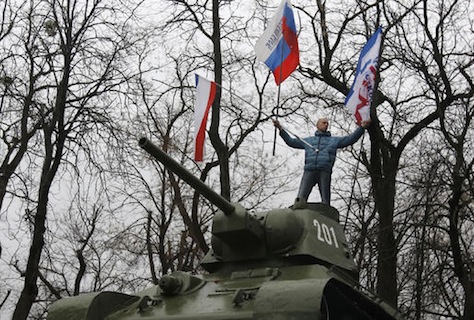Why is US president Barack Obama using so much bluster to warn Russian president Vladimir Putin against what appears to be a likely military action in Crimea?![]()
![]()
![]()
If your answer to the question involves broad references to ‘appeasement,’ the 1930s, American exceptionalism or to NATO, you should probably re-examine the premises of that answer. In the debate over Ukraine — and now, Crimea — empty talk by US commentators about the vital US interests in Ukraine could do more harm than good. If you’re using ‘national interest’ according to the standard, IR theory definition, it draws from the realist concept that a country acts in international affairs in accordance with its self-interest.
But what is the US interest in whether Crimea is administered from Russian or Ukrainian authority? Ukraine itself lies an ocean and a continent away from the United States. It’s on the periphery of the European Union, and though it may one day be an EU member-state, Russian interference in Ukraine barely ranks among European security threats, though EU leaders should for obvious reasons be much more engaged on developments in Ukraine than US policymakers. European policymakers have a strong stake in Ukraine’s future success.
To argue that the United States has a vital interest in Crimea is to argue that Russia has a vital interest in Puerto Rico.
While there’s a role for the United States to respond to Russian aggression, it’s certainly no reason to start calling for a new Cold War or to start arguing that Obama is somehow powerless to rein in Putin. It’s not a matter of whether US warships, for example, could halt Russian advances in Crimea, it’s a matter of whether it’s worth spending US dollars and risking US lives to do so.
Crimea isn’t your everyday oblast. It has always been a ‘special’ region straddling Russia and Ukraine with a unique history tied to both countries. When Ukraine became an independent country in 1991, Crimea decided to proclaim itself an independent republic in 1992. It ultimately chose to remain part of Ukraine as an ‘autonomous republic,’ with its own constitution and regional parliament, and it’s the only region of Ukraine where ethnic Russians constitute a majority of the local population, around 58% of Crimea’s total 2 million residents. Last week’s anti-Kiev, pro-Moscow demonstrations weren’t the first time Crimeans have clashed with Ukraine’s central government, though. Continue reading Let Russia take Crimea — the focus should be on Ukraine’s economy
